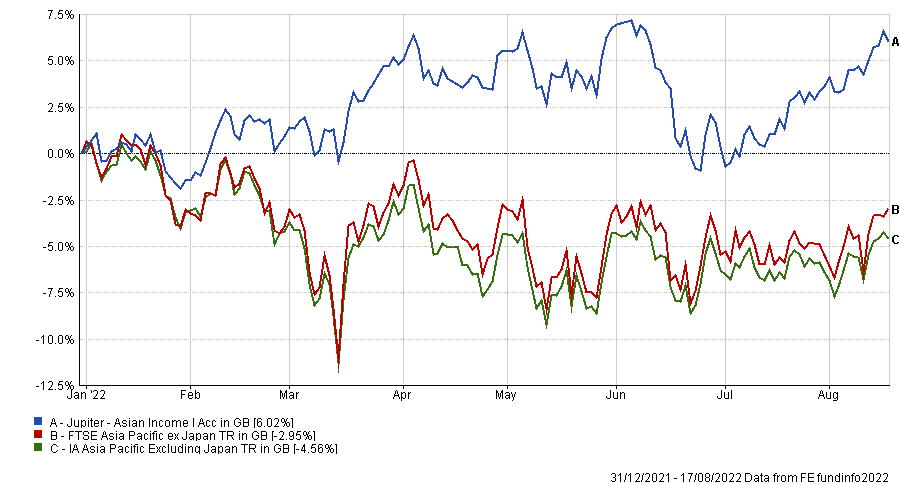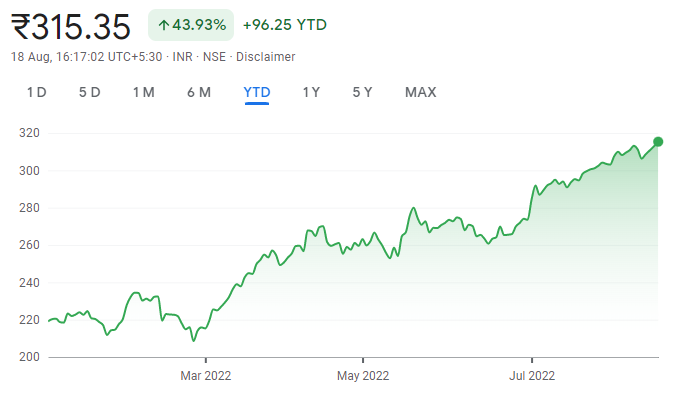As the region’s largest economy, it’s rare to find an Asia fund that does not contain exposure to China, but Jason Pidcock, manager of the Jupiter Asian Income fund, slashed his allocation to zero.
Political risk has been a significant concern for many investors since the Chinese government began implementing harsh policies through its common prosperity programme, but heightening tensions with Taiwan were the final straw for Pidcock.
His £1bn Jupiter Asian Income portfolio is up 105.5% since launching in 2016 and it has continued to climb 6% in 2022 whilst most of its peers in the IA Asia Pacific Excluding Japan sector have struggled to make a positive return.
Total return of fund in 2022

Source: FE Analytics
Here, Pidcock tells Trustnet why he ditched Asia’s largest economy and how intensifying political risk could impact the wider global market.
What is Jupiter Asian Income’s investment process?
I've been investing in Asia for 29 years now and I've always had a bias towards companies that have an ability to pay decent dividends. I think that being able to share your profits with your owners is an important part of being a listed company.
The fund always has to yield at least 20% more than the benchmark and we’ve always been comfortably above the minimum requirements. Today, the fund is yielding about 4.3%.
We've only got 26 holdings in the portfolio today, whereas there’d normally be about 30.
I don't feel that I have to populate the portfolio with lots and lots of stocks. Nothing is held simply because it's a large index constituent.
In fact, anything that we own is almost certainly going to be overweight versus the benchmark. I've only got one stock today in the portfolio where I'm slightly underweight and that's TSMC.
Why is TSMC your only underweight position?
It’s a great company. I'm not expecting it to be my very best performer, but over time I absolutely do think it is a long-term outperformer and it does have a place in the portfolio.
But there are other tech companies that I prefer which are cheaper, that have much higher dividend yields and large net cash positions such as Hon Hai.
I have about 4.5% in TSMC, so it would mean a big change if I didn’t have it. The portfolio would feel a bit naked without it.
What made you cut your exposure to China in July?
I got to a point where I was too uncomfortable investing in China because, politically, I think that it has become a country that is more of an enemy than an ally.
My personal view is they're not going to take the risk of trying to invade Taiwan knowing that so many other countries don’t want this to happen – it would not just the be the end of Xi’s presidency, it's probably the end of Communist Party rule in China.
Attacking Taiwan would send the economy into a tailspin, and it would quickly go into a sharp recession. Portfolio managers would try and get their money out of China as quickly as they could, and we’ve seen the playbook with how quickly Russia was ostracised.
There are so many other countries in Asia that are exciting and have democracies, so my view is ‘why should I bother taking all these risks in China when I can invest in those other countries?’
Of course, you can’t help but get exposure to China's economy indirectly whether you like it or not, and that's not just the case for Asian fund managers. All global equity managers have exposure to China because it’s such a large part of the global economy.
Have you seen many companies try to move away from their dependency on China?
The US government is incentivising chip makers to increase capacity in the US through grants and loans on the condition that they do not invest in China.
Samsung Electronics have to make a choice and there’s no question it’s going to be the US. Again, for companies like TSMC, its clear through their meeting with Nancy Pelosi that they’re going to be favouring the US as opposed to China.
China has a lot of trading relationships but it doesn't have many close political allies, so it would be easier to isolate politically than many people think because it's not just about the size of your economy.
With China being the world’s largest manufacturer, how easy would it be to reduce dependency there?
It certainly won’t be easy, so the sooner we get on with it the better. We certainly don’t want to wait until after the event like we did with Russia.
If Taiwan is attacked, it would cause a massive world recession because it would take out TSMC’s production. It would probably cause bigger problems than the diversion of Russia’s gas.
The process has started but it will take a long time. These plants take a long time to build and you have to have all the connecting infrastructure.
As time goes on it slowly becomes a diminishing threat from a supply chain point of view, so long as they don’t invade between the next 18 months to two years.
Taiwan is your second largest regional exposure – how have tensions affected your conviction there?
A little bit, but not overly because the risk is well known and it’s already capping evaluations in Taiwan. If this risk suddenly evaporated, you would expect to see Taiwanese stocks shoot up because there is that discount which has been there for a number of years already.
If [an attack] happened, Taiwanese equity prices would fall considerably, but so would Chinese equities. They’d fall all around the world and Chinese equities will fall probably be hit the hardest, just as we saw with Russia.
In absolute terms, my fund would go down as would all Asian funds, but I would expect to outperform because my small overweight in Taiwan is massively offset by my huge underweight in China.
What has been your best stock pick over the past year?
I’d say our best was ITC, which is a tobacco company in India. Although cigarettes remain the biggest source of earnings, that’s a low growth part of their business but it is an excellent cash generator.
Its allowed them to expand into other areas such as food and beverage and they’re now one of the biggest companies in India. Now that they have such a large net cash balance, they’re able to make a lot of acquisitions and plug them into its national distribution network.
Their earnings have been growing, their dividends have been growing, they’ve got a rock solid balance sheet but they’re very cheap when compared to other consumer stocks.
Share price of ITC since the start of the year
Source: Google Finance






